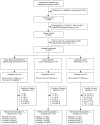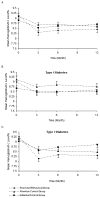The effect of a structured behavioral intervention on poorly controlled diabetes: a randomized controlled trial
- PMID: 21986346
- PMCID: PMC3487475
- DOI: 10.1001/archinternmed.2011.502
The effect of a structured behavioral intervention on poorly controlled diabetes: a randomized controlled trial
Abstract
Background: Although maintaining nearly normal glycemia delays onset and slows progression of diabetes complications, many patients with diabetes and their physicians struggle to achieve glycemic targets. The best methods to support patients as they follow diabetes prescriptions and recommendations are unclear.
Methods: To test the efficacy of a behavioral diabetes intervention in improving glycemia in long-duration, poorly controlled diabetes, we randomized 222 adults with diabetes (49% type 1) (mean [SD] age, 53 [12] years; mean [SD] disease duration 18 [12] years; mean [SD] hemoglobin A(1c) [HbA(1c)] concentration, 9.0% [1.1%]) to attend (1) a 5-session manual-based, educator-led structured group intervention with cognitive behavioral strategies (structured behavioral arm); (2) an educator-led attention control group education program (group attention control); or (3) unlimited individual nurse and dietitian education sessions for 6 months (individual control). Outcomes were baseline and 3-, 6-, and 12-month postintervention HbA(1c) levels (primary) and frequency of diabetes self-care, 3-day pedometer readings, 24-hour diet recalls, average number of glucose checks, physical fitness, depression, coping style, self-efficacy, and quality of life (secondary).
Results: Linear mixed modeling found that all groups showed improved HbA(1c) levels (P < .001). However, the structured behavioral arm showed greater improvements than the group and individual control arms (3-month HbA(1c) concentration changes: -0.8% vs -0.4% and -0.4%, respectively (P = .04 for group × time interaction). Furthermore, participants with type 2 disease showed greater improvement than those with type 1 (P = .04 for type of diabetes × time interaction). Quality of life, glucose monitoring, and frequency of diabetes self-care did not differ by intervention over time.
Conclusions: A structured, cognitive behavioral program is more effective than 2 control interventions in improving glycemia in adults with long-duration diabetes. Educators can successfully use modified psychological and behavioral strategies.
Trial registration: clinicaltrials.gov Identifier: NCT000142922.
Trial registration: ClinicalTrials.gov NCT00142922 NCT00142922.
Conflict of interest statement
A. Enrique Caballero, MD serves on the advisory panels of the following companies: Eli Lilly and Company, Amylin Pharmaceuticals, Inc, Takeda Pharmaceuticals America, Inc, sanofi-aventis, Daiichi-Sankyo. No other author has anything to declare.
Figures
Comment in
-
Improving glycemic control when "usual" diabetes care is not enough.Arch Intern Med. 2011 Dec 12;171(22):1999-2000. doi: 10.1001/archinternmed.2011.496. Epub 2011 Oct 10. Arch Intern Med. 2011. PMID: 21986349 No abstract available.
-
Efficacy of behavioral interventions in patients with poorly controlled diabetes mellitus.Nat Rev Endocrinol. 2011 Nov 1;7(12):691. doi: 10.1038/nrendo.2011.186. Nat Rev Endocrinol. 2011. PMID: 22045108 No abstract available.
References
-
- Hoerger TJ, Segel JE, Gregg EW, Saaddine JB. Is glycemic control improving in U.S. adults? Diabetes Care. 2008;31(1):81–86. - PubMed
-
- Resnick HE, Foster GL, Bardsley J, Ratner RE. Achievement of American Diabetes Association clinical practice recommendations among U.S. adults with diabetes, 1999–2002: the National Health and Nutrition Examination Survey. Diabetes Care. 2006;29(3):531–537. - PubMed
-
- Weinger K, Jacobson AM. Psychosocial and quality of life correlates of glycemic control during intensive treatment of type 1 diabetes. Patient Educ Couns. 2001;42(2):123–131. - PubMed
-
- Roter DL, Hall JA, Merisca R, Nordstrom B, Cretin D, Svarstad B. Effectiveness of Interventions to Improve Patient Compliance: A Meta-Analysis. Med Care. 1998;36:1138–1161. - PubMed
-
- Doherty Y, Hall D, James PT, Roberts SH, Simpson J. Change counselling in diabetes: the development of a training programme for the diabetes team. Patient Educ Couns. 2000;40(3):263–278. - PubMed
Publication types
MeSH terms
Substances
Associated data
Grants and funding
LinkOut - more resources
Full Text Sources
Medical
Miscellaneous



